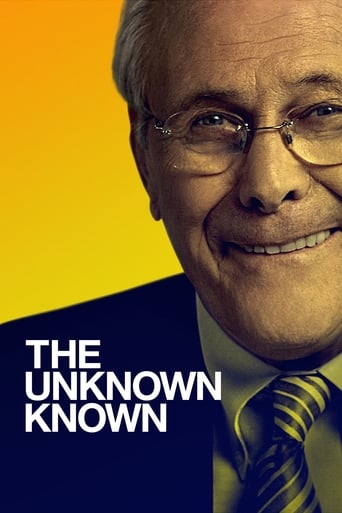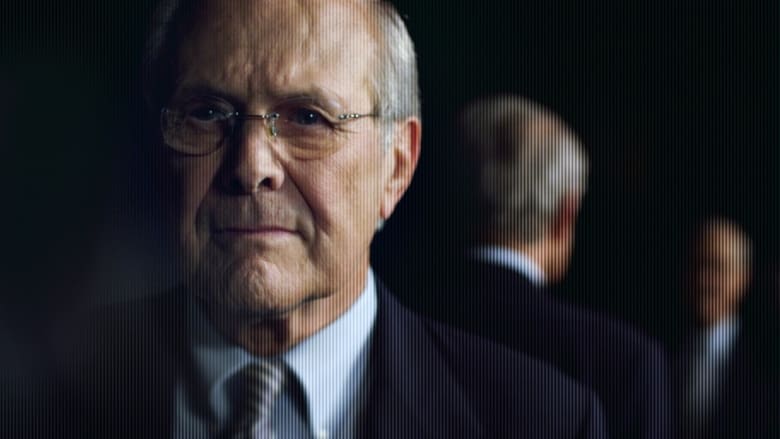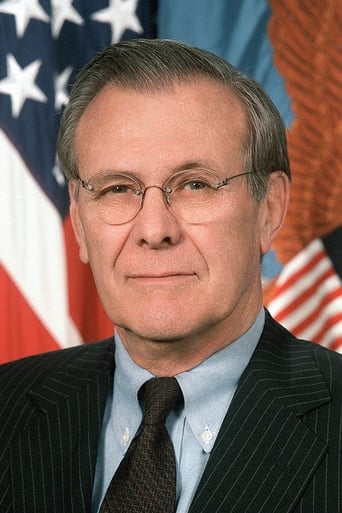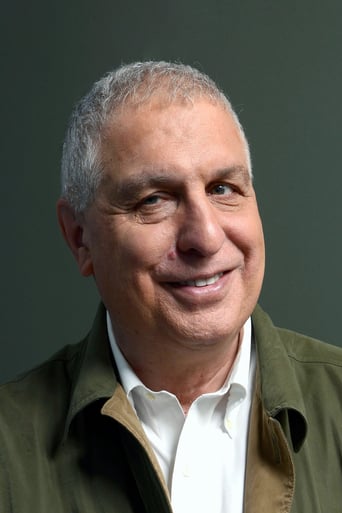

The Unknown Known (2013)
Former United States Secretary of Defense, Donald Rumsfeld, discusses his career in Washington D.C. from his days as a congressman in the early 1960s to planning the invasion of Iraq in 2003.
Watch Trailer
Cast


Reviews
Donald Rumsfeld, The Unknown Known, and his Lifetime of Service to War The Unknown Known is the latest documentary from Errol Morris. Like his interviews with Robert McNamara in his film Fog of War, he interviews another architect of war, this time the Second Iraq War. Unlike former Secretary of Defense Robert McNamara who pushed a continuation of the Vietnam conflict when he was in office, Donald Rumsfeld is not apologetic about his role in sending Americans off to die overseas. In his book In Retrospect, McNamara states in Time Magazine, "We were wrong, terribly wrong. We owe it to future generations to explain why."Rumsfeld has no apologies to make, according to the man himself. And he learned no lesson from Vietnam except, as he would say, "it was a failure of imagination" that we lost in Vietnam. Even Nixon apologized about his mistakes when talking to David Frost. I am sure Director Morris was under legal contract not to ask tough, direct questions of Rumsfeld. Thus, he let Rumsfeld indict himself. Rumsfeld is narcissistic and unapologetic about the Second Iraq War. He sees no wrong in making the U.S. strong militarily regardless in how that strength is used. He does not, in The Unknown Known, see that the Second Iraq War was based on lies at all. He sees no lies. He submits that Saddam Hussein and Iraq did have WMDs, we just couldn't find them. He believes the U.N. weapons inspectors were duped and needed to keep looking. He does not agree that water boarding is torture, no matter what Human Rights Watch and others say. He sees know wrong except in our "failure of imagination."Rumsfeld is a master of Newspeak, using phrases like "peace through strength", and "weakness is provocation." This all comes out in the movie, and it was no surprise to most of the audience. He lives in a world of lies, and the person he deludes the most is himself. Rating: Rent it. It is worth a view, and I would love to say that you should see it multiple times. But there are no dramatic revelations in the movie, no sense of awaking. In fact, the lesson is that a beltway insider has many ways to deny the suffering of others, especially those we kill thousands of miles away for no cause. Rumsfeld sees war not as a destination, but a journey. As long as the U.S. stays on that journey, he is happy. Peace, Tex Shelters
They say 'never forget 9/11'. Of course. I say never forget Rumsfeld, a man who at times seems fairly intelligent (cue up George Carlin's quick follow-up - "AH, he's FULL OF (bleep)!") and other times answers Errol Morris' questions in such a way where Morris just leaves the camera on him for a while afterward. There's almost that sensation looking at him like 'you stare at the abyss...' And yet, he did offer up his resignation at the time of the Abu-Gharib scandal, which seems for me to be a new revelation - and by the way, this is as much if not more-so a follow-up to Morris' Standard Operating Procedure as it is the Fog of War, the story of the soldiers there doing the torture and the pictures, this time it's the "Captain" - though how genuine this was, and of course how awfully it makes Bush look for not accepting it, is up for debate. There are a lot of shots of the ocean here, at one point an 'ocean of words' even. I feel like this is a superb metaphor for the film and this figure - what do we see when we look at it? Why does it look so calm? Morris never shows an ocean in a stormy mode; just the very calm surface, at one point split right down the middle. But there's so much going on underneath it. Plus aerial shots of the swamps as well.Morris' direction is impeccable as always, a fantastic, spot-on mix of news footage, many clips from Rumsfeld press conferences like when he first posited the 'known known etc' bit, as if he were giving out a portion of a script for a Jean-Luc Godard movie or some semantic babble (maybe poignant, but still babble). It almost has the effect, if only here and there, of the 'point-counter-point' method used on The Daily Show, showing him saying one thing here, another thing later. This isn't played for laughs, though, unless they are of the most highly uncomfortable, awkward, almost horror-movie variety.This is someone looking head-on, and Morris has always been the great detective of documentary directors, seeing how the facts pile up. But even here, what's remarkable, is that Morris puts his voice more than I've seen him do in past films. And at one point in reaction to Rumsfeld saying he never read documents pertaining to a particularly egregious act of abuse on detainees, he says in incredulity "REALLY?" This film is a burning reminder what a slippery character Rumsfeld was and is. He also had a knack for being efficient back in the Ford and Regan era as an envoy - of course they make light of his meeting with Sadaam in 1983, but more telling is how much Rumsfeld wanted to meet with and did spend hours with one of his 2nd in command and, it's almost the sense, he kind of identified with him - but really his time in Bush Jr's Sec post was where he made his name for better and worse...Actually, who really "knows" if it's for better, given with everything that he oversaw and approved of - or didn't approve but we can't really know what was approved or not approved (and then one gets into the "more you look the less you know" facet of things, which in this film and filmmaker carries as a an intense underlying ideology, but I digress sort of). It's fascinating to watch him and hear him talk, as much as it is almost creepy every time he gives his s***-eating grin. Not just the smile but the eyes as well.What is he thinking when he says these things, responding to Morris as he did in his press conferences with questions that he answers himself? Morris uses a visual approach of dictionary terms at many points, as well as Rumsfeld's countless memos, and I got a sense of a man who was very much aware of what he was doing. And, at the end of it all, when Morris asks point blank "Why are you doing this, talking to me?" with "That's a vicious question... I guess you'll never know" I have to wonder if he does, or really doesn't.The Unknown Known. I never have quite forgotten Rumsfeld over the years since he left his office in 2006, but this film brought back a flesh flood of memories along with that face and old but very much KNOWING eyes. At the end of the day, he is not a stupid man, or at least believes he isn't, has his own rigorous set of logic and follows it. That it also led it into two wars, one still going on, and so so so so many lives lost.... damn.
The Unknown Known is Errol Morris' biopic on Donald Rumsfeld, navy officer, congressman, special envoy, secretary of defense for two presidents(Jerry Ford and W.) Morris's previous work includes Gates of Heaven, Vernon, Florida, Thin Blue Line, A Brief History of Time and Fog of War all highly praised and, along with Chris Marker, he might be the most idiosyncratic picture maker of the post-modern era. Famous sequences: Rumsfeld explaining the "unknown known;" his early career in the Nixon and Ford administrations; the black and white time lapse sequences; the attack on the Pentagon; Rumsfeld constant smirk as he explains his actions before and after 9/11. this one isn't probably isn't up to par with his other work and it might not please the echo chambers on both sides of the political spectrum. however, it's worth a look.
Your instinct will tell you that Rumsfeld reveals nothing in this film. Criminal lawyers won't find any previously undisclosed testimony (or even evidential leads) for Hague prosecutions. For journalists, there are no obvious new headlines. But for criminologists (like myself and my colleagues at ISCI), the curious, and students of society, his performance is illuminating. Morris laments (at an ICA Q&A - 19th March 2014) the torturous process of interviewing this vacuous, irony free memo-maniac: "there's just nothing there!" But - to paraphrase Don - the presence of nothing does not mean everything is absent. The filmmakers expertly splice in documents and images to portray a relentless parade of dangerous and shady characters. Nixon, Ford, Regan, Kissinger, The Bushes and a diabolical pair who weaved in and out of successive administrations as if riding a macabre carousel: Rumsfeld and his trusty "assistant" Cheney. Thanks to Rumsfeld's predilection for recording and typing up his entire thought process, many converted to and sent as typed memos (available here: http://papers.rumsfeld.com/), Morris had the ammunition to potentially destroy Rumsfeld's self-constructed world. But he doesn't. Instead he allows us to observe Rumsfeld in his natural state, and in all it's frightening glory. Fog of War it is not. It is fine cinema. Ask yourself while you watch it: is Rumsfeld clever clever, or stupid clever? Or clever stupid?



